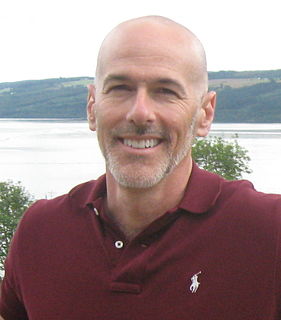A Quote by H. P. Lovecraft
Science, already oppressive with its shocking revelations, will perhaps be the ultimate exterminator of our human species - if separate species we be - for its reserve of unguessed horrors could never be borne by mortal brains if loossed upon the world.
Related Quotes
Human beings are not inevitable, and our brief existence is not preordained to be extended into the distant future. If Homo sapiens is to have a continued presence on earth, humankind will reevaluate its sense of place in the world and modify its strong species-centric stewardship of the planet. Our collective concepts of morality and ethics have a direct impact on our species' ultimate fate.
Clearly, we are a species that is well connected to other species. Whether or not we evolve from them, we are certainly very closely related to them. A series of mutations could change us into all kinds of intermediate species. Whether or not those intermediate species are provably in the past, they could easily be in our future.
From the point of view of the species, death is part of this whole process. You could say that species have evolved in such a way that individual members last a certain time. Perhaps a certain kind of species would be better able to survive if the individuals didn't last too long. Other kinds could last longer.
A species has to become pretty intellectually advanced in order to grasp the concept of death in the abstract, and to dream up the idea of immortality. Long before that (in evolutionary terms) all species with brains have the survival instinct in some form. So, I am just saying that there are many existent proofs of species that have one, but not the other.
We lay on the ground and kissed. Perhaps you smile. That we only lay on the ground and kissed. You young people can lend your bodies now, play with them, give them as we could not. But remember that you have paid a price: that of a world rich in mystery and delicate emotion. It is not only species of animal that die out. But whole species of feeling. And if you are wise you will never pity the past for what it did not know. But pity yourself for what it did.
Human beings never think for themselves. For the most part, members of our species simply repeat what they are told - and become upset if they are exposed to any different view. The characteristic human trait is not awareness but conformity. We are stubborn, self-destructive conformists. Any other view of our species is just a self-congratulatory delusion.
The Creator would appear as endowed with a passion for stars, on the one hand, and for beetles on the other, for the simple reason that there are nearly 300,000 species of beetle known, and perhaps more, as compared with somewhat less than 9,000 species of birds and a little over 10,000 species of mammals.
A large animal needs a large area. If you protect that area, you're also protecting thousands of other plants and animals. You're saving all these species that future generations will want - you're saving the world for your children and your children's children. . . . The destruction of species is final. If you lose a species, you lose the genes, you lose all the potential drugs and potential foods that could be useful to the next generations. The ecosystems will not function as they have.
It must be stressed that there is nothing insulting about looking at people as animals. We are animals, after all. Homo sapiens is a species of primate, a biological phenomenon dominated by biological rules, like any other species. Human nature is no more than one particular kind of animal nature. Agreed, the human species is an extraordinary animal; but all other species are also extraordinary animals, each in their own way, and the scientific man-watcher can bring many fresh insights to the study of human affairs if he can retain this basic attitude of evolutionary humility.





































